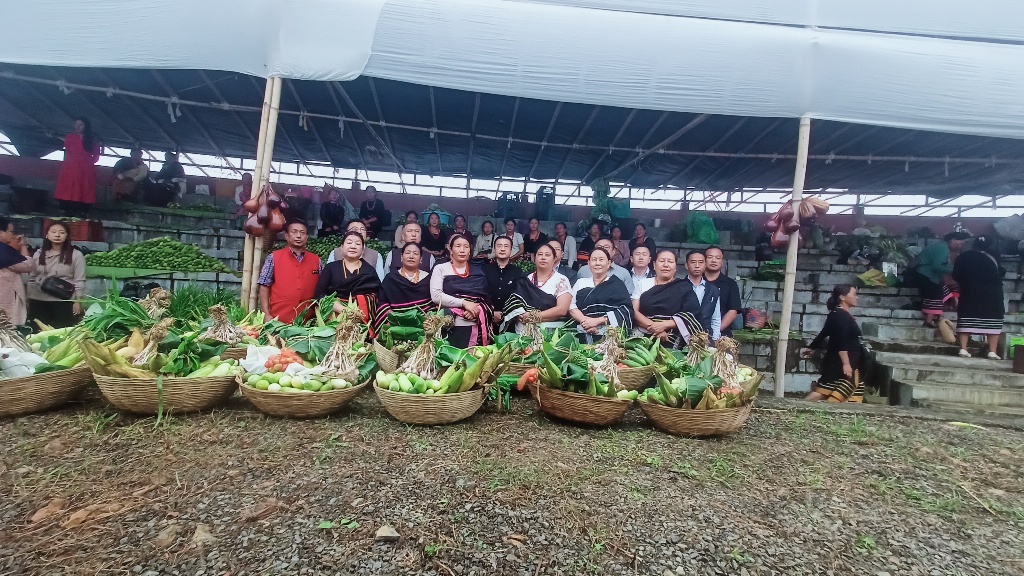Chiechamiapfü Mechü Krotho organises third annual ‘Jhum Fair’ at the Amphitheatre, Chiechama village.
Share

CHIECHAMA — The third annual ‘Jhum Fair’ organised by the Chiechamiapfü Mechü Krotho (CMK) was held on Friday at the Amphitheatre, Chiechama village, with Neibalie Rio, Special Officer to the Chief Minister, attending as the special guest.
The event also featured the inauguration of the CMK's new marketing shed by the special guest.
Addressing the event, Rio said agriculture will continue to be the economic backbone of the state and, in this regard, he called for a concerted effort by all stakeholders to responsibly contribute towards the uplift of the farmers.
Also read: Fazl Ali College organises community extension service
He stated that agriculture is the mainstay and primary livelihood of Nagaland, with more than 70% of the total population engaged in farming activities, wherein terrace and jhum cultivation are the two methods by which crops are grown in the state.
He also noted that most festivals celebrated in the state revolve around agriculture, adding that traditional agricultural practices in Nagaland have been passed down through generations and form a vital part of the state’s cultural identity.
Rio noted that the state government, realising the importance of agriculture in the state, provides funds for this sector every year and implements various schemes/programmes to reach out to farmers.
He highlighted that, like any other part of the state, Chiechama village has also benefited a lot through various initiatives and mentioned the record received from the Department of Agriculture under Chiephobozou SDAO. As per the record, there are 6,030 farmers registered under the PM Kisan Scheme, out of which 912 beneficiaries are from Chiechama village.
Through this scheme, a farmer receives INR 6,000 per year in three instalments.
He also stated that last year, under the Mission Organic Value Chain Development for North East Region (MOVCD-NER), the Agriculture department targeted the cultivation of Job's tears at Ciethu Jhum field, for which 140 farmers from Chiechama village registered and received an amount of INR 7,000 per beneficiary through Direct Benefit Transfer (DBT).
Rio also expressed delight that in 2024, Chiechama village successfully harvested around 10 MT of Job's tears, which was marketed to New Delhi and other states.
Highlighting that this year the government is focusing on natural farming, he said the Government of India has launched the National Mission on Natural Farming to promote traditional indigenous practices of sustainable farming and naturally grown chemical-free production.
Under this scheme, 125 farmers forming one cluster out of the five clusters in the Chiephobozou block have registered and will receive support of INR 4,000 per year each in two instalments through DBT in their accounts.
He also mentioned that the Rural Development (RD) department, through the State Rural Livelihood Mission to promote and assist farmers in agriculture and livestock, has 312 registered SHGs under Chiephobozou block (around 2,311 beneficiaries).
He asserted that the government is prioritising and giving importance to the agri and allied sector, and that every year the state government spends about INR 400 to 500 crores in providing state shares for Centrally Sponsored Scheme (CSS).
Pointing out that traditional agricultural practices in Nagaland have been passed down through generations and form a vital part of the cultural identity, he expressed concern that younger generations are gradually moving away from age-old practices as they tend to migrate to urban areas in search of a more comfortable lifestyle, education, and employment opportunities.
In this regard, he urged parents and elders to encourage younger generations to embrace and preserve traditional agricultural practices and knowledge to ensure food security, self-sustainability, and the preservation of cultural roots.
Additionally, Rio also urged the CMK to collaborate with the Village Education Committee (VEC) and impart traditional agricultural practices at the school level as part of extra-curricular activities so that children will gain basic knowledge and continue the practices.
Emphasising the importance of preserving indigenous species, he stated that mixed products will not only spoil product value but will also be invasive, outgrowing native species and making the area more susceptible to new insects and diseases, resulting in the loss of traditional species.
He cited the ‘Chizami Seed Bank,’ which conserves about 150 traditional varieties to build climate resilience and ensure seed availability during shortages.
Block Development Officer (BDO) Chiephobozou, Seyiekhrielie Rio, in his speech, acknowledged Chief Minister Neiphiu Rio for working towards the empowerment of farmers and women. He also commended the CMK for executing the project well and for its exemplary work for the welfare of the people.
A report on the construction of the marketing shed was presented by Thejangunuo Theünuo.
Neikuonuo Rüpreo, president of CMK, led the programme, and a dedicatory prayer was offered by Rev. Soneiu Metha, Pastor of Baptist Church Chiechama.